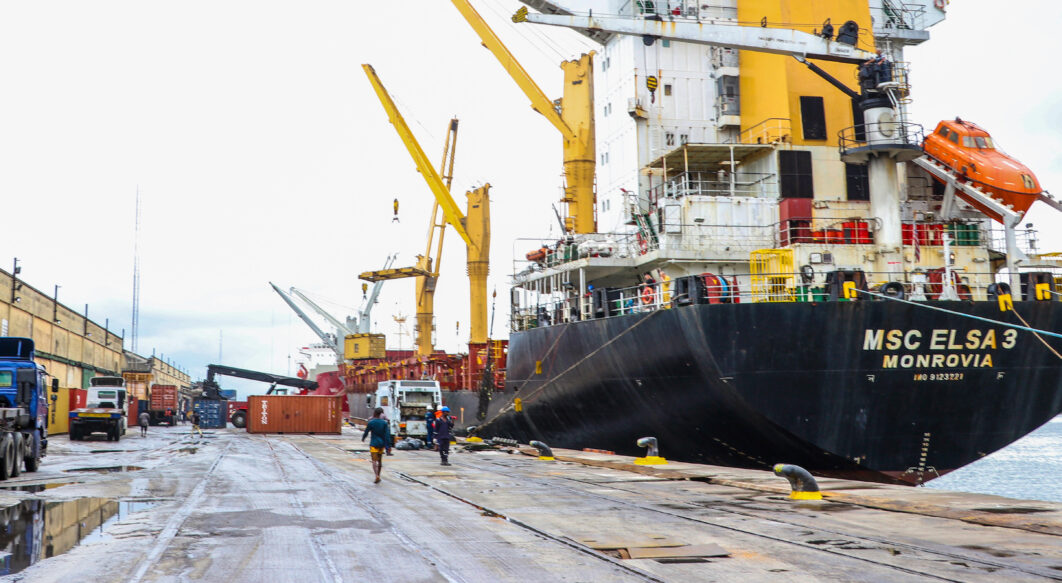Some of the major challenges hampering the development of the nation’s seaports are the absence of modern infrastructure, equipment and technology to drive the port effectively and efficiently.
Nigerian ports receive the lowest containers among its contemporaries in West and Central Africa. According to statistics, Nigeria’s ports receive a paltry 2 million containers every year, compared to what other smaller African countries in population and Gross Domestic Products (GDP) have a modern port received yearly.
To this end, it was argued that Nigeria, with over 200 million citizens, received the lowest number of containers when compared to its population.
However, the deficit of infrastructure, shallow draught, and technology, among others, have made the Nigerian port unattractive to Very Large Container Carriers (VLCC).
Marítime experts have argued that 80 per cent of vessels that call at the nation’s seaports yearly are smaller vessels that cannot navigate the shallow draught of the ports, thereby, smaller vessels coming with 3000,-4000 containers.
However, to achieve efficiency, attract Very Large Container Vessels (VLCC), increase investment in the Marítime sector and bring the ports up to speed with those of its peers in terms of infrastructure and equipment, the Nigerian Ports Authority (NPA) secured approvals for an upward review in its tariffs.
The tariff of the authority, which was last reviewed in the year 1993, will not affect item rates like throughput and lease fees, rents on NPA Landed Properties, MOWCA levy, Service Boat operations and hourly towage and mooring charges.
The 15 per cent upward increase, which is to cut across all NPA rates and dues, is premised on the urgent need to address the undesirable reality of aged and weak Infrastructure, obsolete equipment and slow Port capacity expansion, which has continued to diminish the performance and indeed competitiveness of Nigerian Ports.
Speaking on the tariff hike, a clearing agent operating at the Apapa seaport, Chukwuma Onyebuchi, said existing tariffs were set devoid of capital cost, labour cost, consumables and overhead expenditures needed to run the ports.
Onyebuchi argued that keeping the ports on the old tariff would promote consequences like poor service, inadequate infrastructure, poor remuneration, obsolete critical port facilities, equipment and infrastructure.
According to Onyebuchi, the tariff review constitutes a critical success factor in Nigeria’s quest to win back cargo handling business, and its accompanying benefits, including job opportunities it had lost to its maritime neighbours.
“Globally, port authorities depend on revenue from operations to stay alive to their responsibilities which include construction and maintenance of port infrastructure, dredging of channels, provision of aids for safe navigation, provision of modern marine crafts for efficient harbour services, automation and digitisation of port transactions, port security, energy efficiency and training and retraining of its employees.
“The global index of port rating and competitiveness which the international trade community relies on for its choice of countries to do business with, derives its data from how well the aforementioned responsibilities are addressed.
“Coming at this period of global economic upheaval and scramble for markets, this belated tariff review borne out of necessity constitutes a critical success factor in Nigeria’s quest to win back cargo handling business, and its accompanying benefits, including job opportunities it had lost to its maritime neighbours.
“Contrary to the popular but erroneous notion that attributes high Port costs to NPA relative to its peers, verifiable data shows NPA Tariffs are amongst the lowest in the region.”
Also speaking, an importer, Dr Alex Obaze, said the tariff review provides the necessary guarantees to fund the acquisition and urgent deployment of the Information Communications Technology (ICT) backbone of the PCS which is the precursor to the implementation of the NSW.
Dr Obaze argued that the increased revenue generation arising from the review will lead to critical maintenance works on dilapidated infrastructure in the port as well as open up the Eastern Ports for increased vessel and cargo traffic.
He said it would also lead to the reconstruction of collapsed Escravos Breakwaters and challenged aspects of Rivers, Onne and Calabar Ports, respectively.
“The high incidence of unreceipted costs due to unduly high human interface, bureaucratic bottlenecks, and functional overlaps resulting from the absence of a Port Community System (PCS) and its corollary, the National Single Window (NSW), are responsible for this contrived falsehood.
“Although long overdue, a quick win benefit of the NPA Tariff review for stakeholders is the immediate boost it gives to the Authority to fast-track the commencement of actual works on its concluded port reconstruction and modernisation plans.
“Secondly, the tariff review provides the necessary guarantees to fund the acquisition and urgent deployment of the Information Communications Technology (ICT) backbone of the PCS which is the precursor to the implementation of the NSW.
“Furthermore, the increased revenue generation arising from the review buoys the Authority’s capacity for critical maintenance works to open up the Eastern ports for increased vessel and cargo traffic such as the reconstruction of collapsed Escravos Breakwaters and challenged aspects of Rivers, Onne and Calabar Ports respectively.”
Speaking, Joshua Asanga, a stakeholder, agreed with the increase, adding that the value of NPA’s present tariff has since been suppressed as Inflation is at about 35 per cent.
Asanga listed port management liabilities like wages, fuel and other areas of expenditure as having adjusted upwards without a commensurate rise in NPA charges for over thirty years.
He added that NPA needs funds for improved port infrastructure, robust ICT for the Port Community System, procurement of tug boats and other operational platforms to achieve efficiency
Demian Ukagu, however, talked about the need to apply more NPA funding to outer port facilities and jetties like the Kirikiri Lighter Terminal and the development of other critical port facilities across the country.
He added that NPA rates should be able to cover these costs, guarantee a minimum return on investment, and promote sustainable trade.





